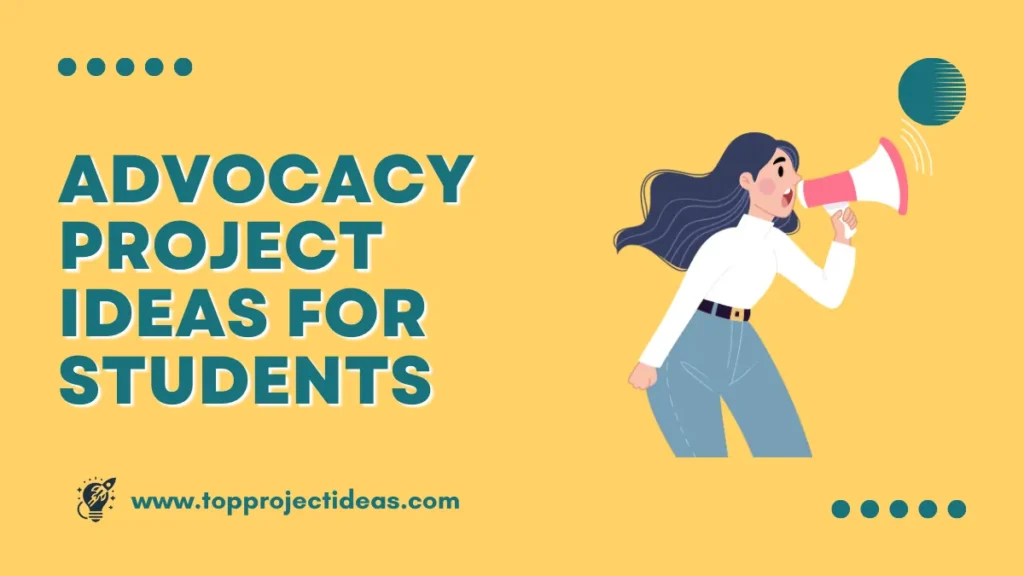
Advocacy is about speaking up for a cause you believe in and working to bring about positive change.
If you’re a high school student looking to make a difference, starting an advocacy project is a great way to get involved.
This blog will guide you through the process, from choosing a project idea to understanding the benefits of advocacy. Let’s get started!
Benefits of Doing an Advocacy Project
Advocacy projects offer numerous benefits:
- Develops Leadership Skills: You’ll learn to lead, organize, and inspire others.
- Enhances Communication Skills: You’ll improve your ability to convey ideas clearly and persuasively.
- Builds Community Connections: You’ll meet new people and build relationships with community members and organizations.
- Creates Positive Change: Most importantly, you’ll be working towards making a real difference in your community or even globally.
How to Choose a Good Project Idea
Choosing the right project idea is crucial. Here are some tips:
- Identify Your Passion: What issues are you passionate about? This could be environmental conservation, mental health awareness, animal rights, or any other cause that you care deeply about.
- Research the Issue: Understand the problem you’re tackling. Research current efforts and identify gaps where you can contribute.
- Consider Your Skills: Think about what skills you have or would like to develop. For example, if you enjoy writing, you could start a blog or write articles to raise awareness.
- Set Achievable Goals: Make sure your project has clear, realistic goals. This will help you stay focused and measure your success.
Must Read: 69+ Top-Rated Digestive System Project Ideas
Best 50 Advocacy Project Ideas for Students (Updated 2024)
Advocacy projects can be tailored to different experience levels. Whether you’re just starting out or you’re looking to take on a more challenging project, there are plenty of options to make a difference. Here are 50 advocacy project ideas categorized by difficulty level: beginners, intermediate, and advanced.
Beginner Advocacy Project Ideas
These projects are perfect for students who are new to advocacy and looking to get their feet wet.
Environmental Advocacy
- Recycling Program: Start a recycling initiative in your school.
- Plastic-Free Challenge: Encourage classmates to go plastic-free for a week.
- School Garden: Plant a small garden to promote sustainable practices.
- Beach Cleanup: Organize a beach or park cleanup day.
- Water Conservation Campaign: Educate students on how to save water.
Mental Health Advocacy
- Mental Health Posters: Create posters that promote mental health awareness.
- Stress-Relief Activities: Organize lunchtime yoga or meditation sessions.
- Positive Message Board: Set up a board where students can leave encouraging notes for each other.
- Mental Health Resource List: Compile and distribute a list of local mental health resources.
- Mindfulness Minute: Start a daily mindfulness practice over the school intercom.
Social Justice Advocacy
- Anti-Bullying Pledge: Get students to sign a pledge against bullying.
- Diversity Day: Organize a day to celebrate different cultures and backgrounds.
- Equality Posters: Design and display posters promoting equality and inclusion.
- Community Service Club: Start a club focused on community service projects.
- Kindness Challenge: Create a challenge encouraging students to perform acts of kindness.
Intermediate Advocacy Project Ideas
These projects require more planning and coordination but are still manageable for students with some advocacy experience.
Environmental Advocacy
- Energy Conservation Campaign: Encourage energy-saving practices in your school.
- Composting Program: Start a composting initiative for cafeteria waste.
- Green School Certification: Work towards getting your school certified as an eco-friendly institution.
- Sustainable Fashion Show: Organize a fashion show featuring sustainable clothing.
- Carpool Week: Promote carpooling to reduce carbon emissions.
Mental Health Advocacy
- Mental Health Fair: Host a fair with booths providing information and resources.
- Peer Counseling Program: Train students to provide peer support.
- Mental Health Speaker Series: Invite mental health professionals to speak at your school.
- Awareness Video: Create a video to raise awareness about mental health issues.
- Support Group Meetings: Facilitate regular meetings for students to discuss mental health topics.
Social Justice Advocacy
- Equal Rights Workshops: Host workshops on topics like gender equality and racial justice.
- Voter Registration Drive: Organize a drive to help students and community members register to vote.
- Petition Campaign: Start a petition for a social justice cause.
- Awareness March: Plan a peaceful march or rally for a cause you care about.
- Charity Fundraiser: Raise funds for a social justice organization.
Advanced Advocacy Project Ideas
These projects are more complex and may require partnerships, extensive planning, and a higher level of commitment.
Environmental Advocacy
- Renewable Energy Initiative: Advocate for the use of renewable energy sources in your school.
- Green Policy Proposal: Draft and present a proposal for sustainable practices to the school board.
- Environmental Education Curriculum: Develop and implement an environmental education program.
- Community Solar Project: Work with local government and organizations to set up a community solar panel project.
- Climate Action Plan: Create and advocate for a comprehensive climate action plan for your community.
Mental Health Advocacy
- School Mental Health Policy: Advocate for the adoption of a comprehensive mental health policy in your school.
- Crisis Intervention Training: Work to implement crisis intervention training for teachers and staff.
- Mental Health App: Develop an app to provide mental health resources and support.
- Legislative Advocacy: Advocate for mental health legislation at the local or state level.
- Mental Health Conference: Organize a conference to bring together students, educators, and mental health professionals.
Social Justice Advocacy
- Youth Advisory Council: Establish a council to advise local government on youth issues.
- Policy Change Campaign: Campaign for changes to school or community policies that affect social justice.
- Social Justice Documentary: Produce a documentary highlighting a social justice issue.
- International Partnership: Partner with a school or organization in another country to address global issues.
- Restorative Justice Program: Implement a restorative justice program in your school.
General Advocacy
- Public Speaking Events: Host events where students can speak about their advocacy work.
- Advocacy Training Workshops: Organize workshops to train other students in advocacy skills.
- Community Survey: Conduct a survey to identify community needs and advocate for solutions.
- Media Campaign: Launch a social media campaign to raise awareness for your cause.
- Annual Advocacy Summit: Plan an annual summit to bring together student advocates from different schools.
Advocacy projects are a fantastic way to make a difference, develop skills, and build a better community. No matter your experience level, there’s an advocacy project idea here for you. Choose a cause you’re passionate about, gather your team, and start making a change today!
Must Read: 15 Latest Color Wheel Project Ideas For Cosmetology (PDF Inside)
Why Advocacy Projects Are Important?
Advocacy projects are vital for creating social change and tackling important issues in our communities. Here’s why they matter:
1. Empowering Individuals and Communities
Voice for the Voiceless: Advocacy projects give marginalized and underrepresented groups a platform to be heard. They ensure everyone has a chance to participate in society.
Community Building: These projects unite people with common goals, fostering community and solidarity. This unity strengthens communities and helps them solve problems together.
2. Raising Awareness and Educating
Informing the Public: Advocacy projects educate people about critical issues they might not know about. Raising awareness changes public perceptions and encourages informed, engaged citizens.
Challenging Stereotypes: These projects challenge harmful stereotypes and misconceptions by presenting factual information and personal stories, promoting understanding and empathy.
3. Influencing Policy and Legislation
Policy Change: Advocacy can lead to significant policy changes locally, nationally, and internationally. By lobbying for new laws or amending existing ones, advocates create lasting impacts and improve lives.
Holding Leaders Accountable: Advocacy projects hold public officials and institutions accountable. They highlight issues and demand transparency, ensuring leaders act in the community’s best interest.
4. Driving Social Change
Promoting Justice and Equality: Advocacy projects often focus on social justice, aiming for a more equitable and fair society. They fight for human rights, economic justice, and environmental sustainability.
Encouraging Civic Engagement: By involving people in advocacy, these projects promote active citizenship. Participants learn about their rights and responsibilities and are more likely to stay engaged in civic activities.
5. Personal Development and Growth
Skill Development: Participation in advocacy projects helps individuals develop leadership, communication, critical thinking, and project management skills, valuable both personally and professionally.
Building Confidence: Successfully advocating for a cause boosts confidence and self-esteem, knowing you can make a difference.
6. Creating a Ripple Effect
Inspiring Others: Advocacy projects inspire others to get involved and start their own initiatives. This ripple effect leads to widespread change as more people take action for various causes.
Long-Term Impact: While some projects address immediate issues, many focus on long-term change. They tackle systemic problems and work towards sustainable solutions, creating lasting positive impacts.
Wrap Up
Starting an advocacy project in high school is a fantastic way to develop important skills, build connections, and create positive change.
By following the steps outlined in this blog, you’ll be well on your way to making a difference in your community. Remember, no effort is too small, and every action counts.
So choose a cause you care about, plan your project, and start advocating for a better world today!
FAQs
What are the different types of advocacy projects?
There are three main types of advocacy:
- Self-Advocacy: This is when individuals speak up for themselves and their own needs.
- Individual Advocacy: This involves supporting and representing another person to help them achieve their goals.
- Systems Advocacy: This focuses on changing policies, laws, or practices to improve conditions for a group of people.
The CED (Center for Educational Development) participates in all these types of advocacy to support people with disabilities and their families.
What is a good advocacy plan?
A good advocacy plan varies depending on the goals but typically includes:
- Lobbying: Directly influencing decision-makers to support your cause.
- Campaigning: Mobilizing public action to support your cause.
- Media and Communications: Using various media channels to promote your issue and campaign.
What are the 3 C’s of advocacy?
Discover the value of communication, collaboration, and compromise in advocating for your child’s education. Explore the ways effective advocacy can help ensure you get the services your child needs.

